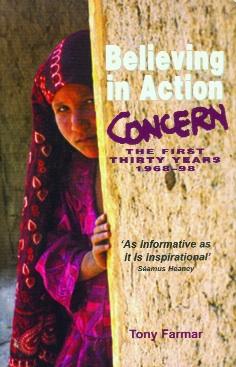Believing in action: Concern the first thirty years, 1968–1998
Published in 20th Century Social Perspectives, 20th-century / Contemporary History, Book Reviews, Issue 4 (Jul/Aug 2006), Reviews, Volume 14 Believing in action: Concern the first thirty years, 1968–1998
Believing in action: Concern the first thirty years, 1968–1998
Tony Farmar
(Concern, E14.99)
ISBN 1 899047 81 6
There was a remarkably rapid mutation in twentieth-century Ireland’s relations with Africa, from its being a rich source of missionaries to being a secular champion of Africa in its times of need and a source of development aid. Missionary numbers were peaking in the 1960s, yet by the end of the 1980s aid and development, whether resourced by government or by voluntary agencies, had become the most visible side of Ireland’s involvement in sub-Saharan Africa.
There was of course a direct connection, or rather many complex links, between the missionary story and what came after. Tony Farmar’s study of Concern is probably the best available to illuminate this evolutionary process. The book focuses on one facet of the story but one that is an intrinsically important part. Having written a number of histories of other Irish institutions and businesses, Farmar was a very good choice for what is a commissioned history, with his knowledge of how complex organisations have recently evolved, a sharp eye for telling detail, and a clear desire to record failure as well as success. In approaching this history, he was obviously fascinated to see how an organisation based on voluntary initiative and the swings of public mood was able to become professional, international and—most of the time—highly successful.
These organisational questions, and the one or two crises in the internal history of Concern, are duly documented, but it is the intrinsic social importance of the organisation in Ireland and Africa and the extraordinary commitment that it inspired that mark out the book. Farmar’s skills as a historian disguise the considerable difficulty of his task, but he manages to weave together the somewhat uneven documentary evidence of the organisation with the oral evidence from interviews he carried out with past and present Concern members to create a very lively account.
Concern began as a response to the gathering crisis in eastern Nigeria in 1967–8, when the breakaway state of Biafra was becoming a huge refugee camp, embracing an area where the Irish Holy Ghost Fathers had been exceptionally active over the previous 60 years. With a network of priests and parish churches across the stricken Igbo region, the order was in a position to distribute food and medicine, but the logistics and the politics of getting aid into the Biafran enclave were enormously problematic. Africa Concern (as it was then known) rose to the challenge: it emerged as a mainly lay organisation because of the difficulty the hierarchy had in supporting an emergency appeal that might alienate the federal Nigerian authorities.
The O’Loughlin Kennedy family and many others led Concern in its heroic phase, and indeed guaranteed that it would retain its de facto Catholic yet unofficial character for more than a decade. During this time it lengthened its agenda and changed its areas of action. The Catholic bishops’ organisation, Trocaire, eclipsed it in the 1970s, but by the 1980s Concern, with its activities in three continents and a support base moving outside Ireland, became a larger and far more influential player.
Concern’s interventions outside Africa, most notably in Bangladesh, Yemen and Cambodia, reveal the organisation’s indomitable versatility, but it has always been an African-focused aid and development organisation, appointing field directors in no less than eleven African countries between 1973 and 1995. And of particular interest in Farmar’s account is Concern’s repeated role in Ethiopia, being first to alert the BBC’s Jonathan Dimbleby to the awful 1973 famine that brought the old regime down, and a decade later trying to get international media to recognise the return of famine to the Marxist Ethiopia, some six months before Mohammed Amin and Michael Buerk awoke the world’s conscience with another BBC exposé.
The soft influence of the churches in this story is everywhere evident, symbolised by the extraordinary service of the Finucane brothers (Father Aengus was director from 1981 to 1997). But against this are the stories of numerous volunteers and professionals motivated by a sense of social justice that was not ostensibly religious but influenced nonetheless by the missionary legacy that had helped to create the space for Irish interventions in Africa.
David Dickson lectures in history at Trinity College, Dublin.
















